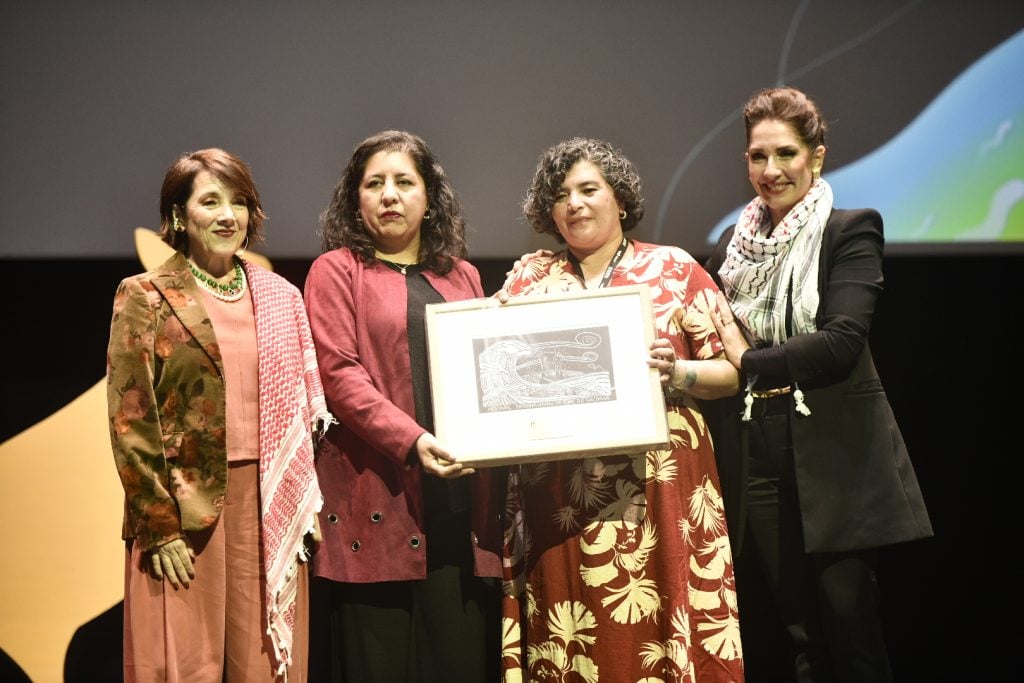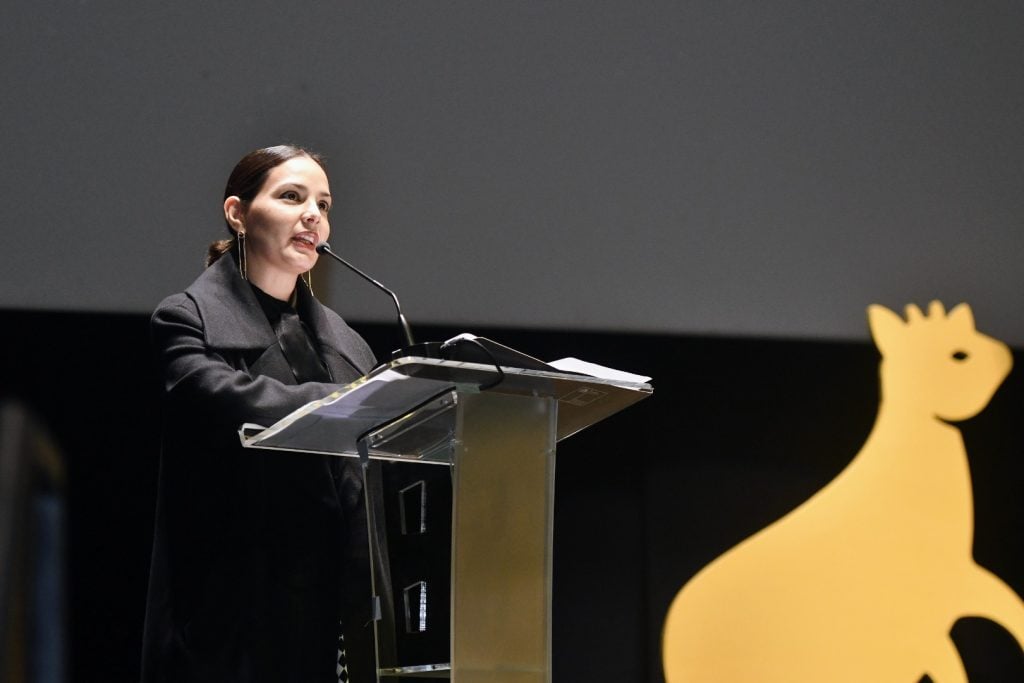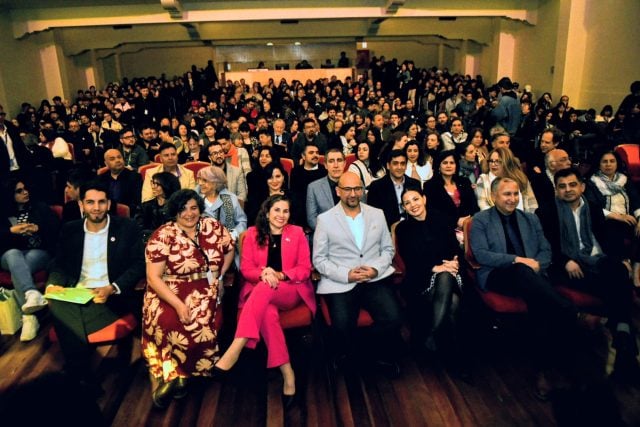On Monday, October 13, the 32nd Valdivia International Film Festival opened with a ceremony at the Regional Cervantes Theater, drawing more than 600 attendees, including filmmakers, jury members, public officials and moviegoers.
This year, the festival broadens its footprint with 11 screening venues, incorporating the 120-seat Hugo Campos Auditorium and the Rudolph Amandus Philippi Museum of Exploration dedicated to expanded cinema. The lineup grows to more than 240 films and debuts three new sections.
Opening night unveiled details of the FICValdivia 2025 Official Selection, the juries tasked with evaluating and awarding the films, and the Opening, Centerpiece and Closing selections, along with Tributes, the International Gala and the Chilean Gala. The ceremony was hosted by actors Mariana Loyola and Paulina García, the latter also a Chilean director and playwright.
During the event, María Loreto Vega, president of the Cultural Center for the Promotion of Cinema, presented a cultural stewardship recognition to Jovita Uribe Quezada, director of Cultural Outreach and Tourism for the Municipality of La Unión, honoring her career and contributions to the region’s culture and heritage.

Official Spot
In addition, the festival premiered this year’s official spot, an energetic, humorous portrait of the cinema marathon that audiences embrace over a week of back-to-back screenings. With playful pacing and momentum, the piece follows a marathon-ready crowd racing through theaters, screens and emotions.
The piece was produced by the Valdivia Cultural Center for the Promotion of Cinema, co-produced with Tronco and The Maestros, with creative direction by Jorge Urzúa and Cristóbal Portaluppi, and sound, music and postproduction by Oreja de Oso, Javier Neira and Alonso Saavedra, alongside a talented cast that brings this celebration of film and community to life.
Finally, Raúl Camargo, director of the Valdivia International Film Festival, presented the short film “PLAYA GRANDE” by Amanda Lucía Turquetto and Héctor Bernabó. Made in 1943 as an institutional commission, the documentary transcends its origins with striking cinematic force, becoming one of the first experimental works in Latin America and the Caribbean directed by a woman.
The ceremony was attended by the Minister of Cultures, Arts and Heritage, Carolina Arredondo Marzán; the Presidential Delegate of Los Ríos, Jorge Alvial Pantoja; Acting Regional Governor Marila Barrientos Triviños; Protocol Mayor of Valdivia, Cristóbal Rosas Laborde; Rector of the Austral University of Chile, Egon Montecinos Montecinos; Acting Regional Director of the Los Ríos Development Committee, José Cayunguir Cáceres; Chair of the Board of the Valdivia Cultural Center for the Promotion of Cinema (CPCV), María Loreto Vega Prieto; and the Director of the Valdivia International Film Festival, Raúl Camargo Bórquez.

A Festival That Grows, Engages and Reinvents Itself
The ceremony introduced the juries and official competitions, along with the Opening, Centerpiece and Closing films, tributes and new sections featured in this edition.
The International Gala will showcase 12 major premieres from leading auteurs, including Hong Sangsoo, Radu Jude, Carla Simón, Lav Diaz and Kaouther Ben Hania, fresh off a win at the Venice Film Festival.
The opening film is led by Argentine director Albertina Carri with ¡Caigan las rosas blancas!, while the closing night will feature Brazilian filmmaker Guto Parente’s Morte e Vida Madalena.
Among this year’s tributes are live-scored screenings dedicated to U.S. pioneer Lois Weber and to the popular classic Maciste en el infierno (1925) by Italian director Guido Brignone.
Additional homages include a salute to Chilean filmmaker Sergio Navarro; a commemoration of 40 years since Alicia Vega’s first film workshop with a screening of Ignacio Agüero’s Cien niños esperando un tren; and a celebration of the 50th anniversary of Raúl Ruiz’s Diálogos de exiliados.
Internationally, the Fulgores del Magreb focus highlights films made by the Algerian and Mauritanian diaspora in France during the 1970s, recovering works that negotiate memory, identity and cultural resistance.
Through Sunday, October 19, audiences can explore the best of contemporary cinema with national and international premieres, retrospectives, tributes and a lineup that reaffirms the festival’s diverse, innovative character.
Screenings will take place in dedicated cinema venues, with the Science Tent at the CECs Center for Scientific Studies on Paseo Libertad serving as the main gathering point—the epicenter of activities and cinematic dialogue.
The Chilean Gala will bring together acclaimed national filmmakers presenting their latest work, underscoring the vitality of today’s Chilean cinema, while the International Gala offers a prime window into contemporary auteur filmmaking.
Artistically and curatorially, FICValdivia 2025 introduces new sections that widen its lens on audiovisual creation.
This year adds the categories Con Ánimo de Humor and Animamundi, dedicated to contemporary comedy and the expansion of Chilean animation. In addition, the Map of Latin American and Caribbean Cinema section proposes a film cartography of the region; its first edition spotlights activist cinema from the Antilles and the Guianas, in collaboration with the Third Horizon Film Festival.
For the first time, the Simbiosis Inmersiva Lab was held—an innovative gathering of filmmakers and science professionals interested in using extended reality technologies for science communication—running in the lead-up to the festival from October 10 to 13.
This lab, part of Encuentros Australes—the festival’s industry platform—grew out of the successful first edition of Simbiosis Inmersiva, which, together with Cine Expandido, anchors the New Narratives section. Both return this year with eight virtual and augmented reality experiences and four video installations that push beyond the limits of the traditional screen.
For lovers of physical formats, the VHS Erótico cycle—focused on Argentine cinema—and VHS Animé—which will revive Japanese classics such as Metrópolis—reclaim the videocassette as a communal, nostalgic ritual. Likewise, the Contemporary Cinema section is organized around the showcases Tramas, Disidencias, Nuevos Caminos and Nocturama, gathering 24 films centered on political, experimental and cultural explorations in today’s cinema.
As is tradition, the VOCES and KAWIN conversation forums return to foster dialogue among filmmakers, critics, academics and audiences, addressing the current challenges of cinema and artistic creation. In addition, from Encuentros Australes, AULA—the festival’s training space—begins Tuesday the 14th with workshops and talks that drive innovation and knowledge exchange, and with support from Corfo Los Ríos it consolidates itself as a meeting point across generations and disciplines.
Meanwhile, the industry arm Encuentros Australes presented the 12 projects selected for Cine Chileno del Futuro 2025, which will receive specialized mentorship in directing and creative development and compete for completion awards.
In the same vein, the second edition of ¡MATCH! Profesional was launched, an initiative that connects creative professionals and companies from regions outside the Santiago province with Chile’s audiovisual ecosystem, fostering innovation, collaboration and territorial development.
In parallel, the festival continues to grow its official podcast “Nadie Dijo Nada,” which premiered its third season with interviews featuring leading voices in contemporary cinema. Free screenings, masterclasses, live-scored films and interactive exhibitions also join the program, strengthening the spirit of exchange that defines the festival.
In this way, the 32nd Valdivia International Film Festival once again stands out as a meeting place across generations, territories and forms of storytelling, consolidating its mission to promote a diverse, critical cinema engaged with its time.
El Ciudadano

